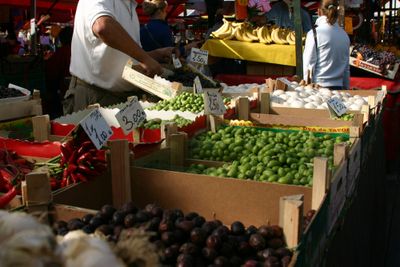European Union trims rules on ‘ugly’ fruit, vegetables

BRUSSELS, Belgium – There’s hope again for homely hazelnuts, misshapen mushrooms and grotesque garlic. Not to mention those onions that are unsightly enough to bring tears to your eyes.
The European Union on Wednesday chopped 100 pages of rules and regulations that open the way next summer to allow the sale of fruits and vegetables that may be crooked, bent or twisted – but otherwise good enough to eat.
So those beastly Brussels sprouts are no longer on the outs.
“This marks the new dawn for the curvy cucumber and the knobbly carrot,” EU Agriculture Commissioner Mariann Fischer Boel said. “We simply don’t need to regulate this. In these days of high food prices and general economic difficulties, consumers should be able to choose from the widest range of products possible.”
The EU ban, imposed more than 20 years ago to ensure uniform shapes and sizes for fruits and vegetables, has triggered much ridicule. The tabloid media have long used it to highlight bureaucrats’ desire to regulate every nook and cranny of Europeans’ lives.
“This is good news for producers and consumers. It may just perhaps even nail once and for all the myth that the EU regulates everything in sight,” said Alyn Smith, a Scottish member of the European Parliament.
The European Commission ended marketing standards requiring 26 fruit and vegetables to be sold without any odd curves. They are: apricots, artichokes, asparagus, avocados, beans, Brussels sprouts, carrots, cauliflower, cherries, zucchinis, cucumbers, cultivated mushrooms, eggplants, garlic, hazelnuts in shell, headed cabbage, leeks, melons, onions, peas, plums, ribbed celery, spinach, walnuts in shell, watermelons and chicory.
“Pretty-food” standards remain in effect for apples, strawberries, citrus fruit, kiwi, lettuce, pears, peaches, nectarines, sweet peppers, table grapes and tomatoes – but governments may allow “uglier” versions to be sold if they wish.
Under the ban, unappetizing fruit and vegetables often ended up in food processors or was discarded.
EU officials said the ban was resisted by Italy, Spain, France and Hungary, which felt it may scare away consumers.
But proponents of the less-than-perfect produce prevailed.
“To stop stores selling perfectly decent food during a food crisis is morally unjustifiable,” said Britain’s Neil Parish, chairman of the European Parliament’s agriculture committee.